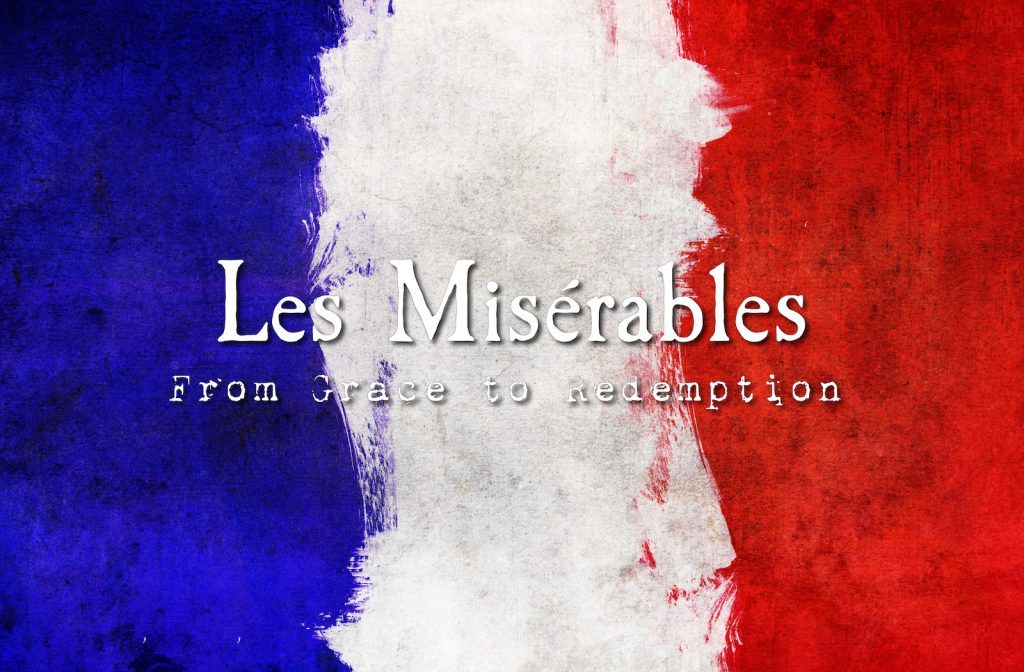This Sunday we continue our series based on the world-famous musical Les Misérables! Previous sermons in this series can be found here.

This Sunday, our series leads us to an understand that we can learn from voices that come in unexpected ways and from unexpected places. The story of the Ethiopian Eunuch is one that reminds us of the infinite availability of God’s grace. I’ve told the story about the congregation I served in Grand Island, NE that included a vibrant Christian community from South Sudan. When asked how Christianity came to the wild country of their native land, they pointed to this story.
Acts 8:26-40 (CEB)
26An angel from the Lord spoke to Philip, “At noon, take the road that leads from Jerusalem to Gaza.” (This is a desert road.) 27So he did. Meanwhile, an Ethiopian man was on his way home from Jerusalem, where he had come to worship. He was a eunuch and an official responsible for the entire treasury of Candace. (Candace is the title given to the Ethiopian queen.) 28He was reading the prophet Isaiah while sitting in his carriage. 29The Spirit told Philip, “Approach this carriage and stay with it.”30Running up to the carriage, Philip heard the man reading the prophet Isaiah. He asked, “Do you really understand what you are reading?”
31The man replied, “Without someone to guide me, how could I?” Then he invited Philip to climb up and sit with him. 32This was the passage of scripture he was reading:
Like a sheep he was led to the slaughter
and like a lamb before its shearer is silent
so he didn’t open his mouth.
33In his humiliation justice was taken away from him.
Who can tell the story of his descendants
because his life was taken from the earth?34The eunuch asked Philip, “Tell me, about whom does the prophet say this? Is he talking about himself or someone else?” 35Starting with that passage, Philip proclaimed the good news about Jesus to him. 36As they went down the road, they came to some water.
The eunuch said, “Look! Water! What would keep me from being baptized?” 38He ordered that the carriage halt. Both Philip and the eunuch went down to the water, where Philip baptized him. 39When they came up out of the water, the Lord’s Spirit suddenly took Philip away. The eunuch never saw him again but went on his way rejoicing. 40Philip found himself in Azotus. He traveled through that area, preaching the good news in all the cities until he reached Caesarea.
Consider these questions:
- Who do you think the Ethiopian Eunuch might represent in today’s U.S. culture? Who might Philip represent? Another way to think about these questions is this: where do you see yourself in this story?
- What do you think was the significance of baptism to the Ethiopian? Is it the same today?
- What does the availability of God’s grace mean to you personally, and to the faith community of PB UMC?
Post-Sermon Update on 5/1
Audio from the sermon can be heard below, and video can be found at this link (will open in a new tab).
Sunday’s message was shared largely in song. Beginning with a song I heard on the Pulpit Fiction podcast by a Christian musician named Jonathan Rundman, the song is entitled “Treasurer’s Report to Candace, Queen of the Ethiopians” (and can be found here in addition to many if your favorite music sites).
In exploring the cultural position of eunuchs, I noted that this Ethiopian may have been the first gender non-binary Christian – a statement that some disagree with. I am surely open to this criticism, and note that there are many possibilities for this individual’s personal history and cultural position. Some of these possibilities can be found via Wikipedia (always check footnotes!). Some additional links that informed my statement can be found below.
- The False Gospel of Gender Binaries – by Rachel Held Evans
- Just As I Am – from Sojourners magazine
- Eunuch defintion – from Nonbinary wiki
- The last eunuch of China – a story distantly referenced during the message that gives one personal story
In addition to the song named above, several other songs were shared to aid us in seeking God’s voice and understanding the journey for those who have felt excluded from communities of faith. These songs were:
- “Where Are You?” – by Bob Rhodes (not available online)
- “Just Wait” – by Blues Traveler
- “Live Like That” – by Sidewalk Prophets
Consider these questions:?
- Have you ever felt prevented from accessing God or excluded from a community of faith? What were the circumstances and how did it feel?
- How do you respond to being excluded – either from your community of faith or in other ways?
- Have you ever felt specifically welcomed into a community of faith? Have you been told that nothing could keep you from being baptized (actually or otherwise)? If so, how did it feel? And if not, how do you imagine that might feel?
One final note, related to this last question. If you are a member of this faith community and feel excluded, please talk to me. If you are not a member of this faith community but would like to experience welcome, consider joining this faith community or finding a faith community through helpful places like Reconciling Ministries Network, Church Clarity, Gay Church, and others.
